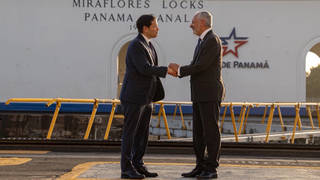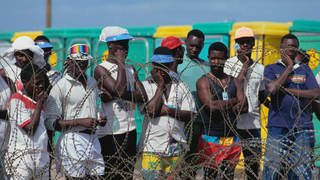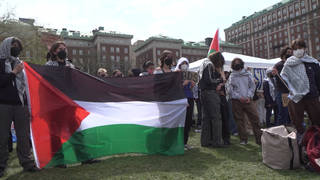HeadlinesJune 20, 2012
Egypt: Mubarak Said to Be in Coma as Crowds Protest Military
Former Egyptian President Hosni Mubarak is reportedly on life support after suffering multiple strokes, adding new uncertainty to the ongoing turmoil surrounding Egypt’s transition to civilian rule. Earlier reports said Mubarak had already been declared “clinically dead,” but Egyptian officials now say Mubarak is in a coma and on a respirator. As the news of Mubarak’s deteriorating health spread, tens of thousands of Egyptians gathered in Cairo’s Tahrir Square and outside the Egyptian parliament in rallies called by the Muslim Brotherhood. The protesters denounced the ruling military council’s recent decrees limiting presidential authority and assuming all legislative functions. Both the Muslim Brotherhood’s candidate, Mohamed Morsi, and his opponent, Ahmed Shafik, have declared victory in the runoff vote.
WikiLeaks’ Assange Takes Refuge in Ecuadorian Embassy
WikiLeaks founder Julian Assange has taken refuge in Ecuador’s embassy in London and asked for asylum. Assange made the move Tuesday in a last-ditch bid to avoid extradition to Sweden over sex crime accusations. Earlier today, police in London announced Assange is now subject to arrest because his decision to spend the night at the Ecuadorian embassy violated the conditions of his bail. Assange is seeking asylum because he fears extradition to Sweden may lead to his transfer to the United States, where he could potentially face charges relating to WikiLeaks.
Syrian Siege of Homs Continues Despite Pleas for Trapped Civilians
Syrian forces continue to shell the besieged city of Homs despite pleas to allow the free exit of trapped civilians. Speaking at the United Nations, Assistant Secretary-General Oscar Fernandez-Taranco urged the regime of Bashar al-Assad to stop attacks on civilian areas like Homs.
Oscar Fernandez-Taranco: “The situation in Homs is particularly alarming. The tragic human suffering resulting from the escalating conflict calls for urgent and concerted efforts to avoid a full-scale civil war. Time is running out. The secretary-general has repeatedly underscored that the government of Syria bares the prime responsibility to change course and fully implement the six-point plan. Shelling and firing against population centers by government forces, including tanks and helicopters, must stop immediately.”
U.N. Monitors Report Being Repeatedly Attacked in Syria
U.N. observers remain idle in Syria after halting operations due to unsafe conditions. In a briefing to the U.N. Security Council, the head of the observer mission, General Robert Mood, said his monitors were repeatedly attacked before he decided to suspend their mission.
Robert Mood: “Violence, including shelling, small arms fire and other incidents, are coming much closer, and we have been targeted several times over the last few weeks. This violence to the UNMOS, in itself, but also because it made it very difficult to execute the mandated activities of my mission, led me to the decision a few days ago to halt the activities of UNSMIS.”
Syrian Ambassador: Gov’t Is Committed to Rights of Civilians
More than 3,300 people have reportedly been killed since the U.N. observers were deployed to Syria two months ago. Also speaking before the Security Council, the Syrian ambassador to the United Nations, Bashar Ja’afari, claimed his government is committed to protecting its civilian population.
Bashar Ja’afari: “I reiterate on behalf of my government that Syria cares not only about couple hundreds of civilians trapped in some rebels’ strongholds in Homs, but the Syrian government is totally committed to protecting the rights of 23 million Syrian civilians.”
Obama Talks Syria with Russia, China
The violence in Syria has fueled diplomatic tensions between the United States and Syria allies Russia and China. After new talks at the G20 summit in Mexico, President Obama said the two sides remain far apart on a response to the violence.
President Obama: “We had a very candid conversation. I wouldn’t suggest that at this point the United States and the rest of the international community are aligned with Russia and China in their positions, but I do think they recognize the grave dangers of all-out civil war.”
Violence Erupts on Israel’s Gaza, Egypt Borders
Violence has erupted along Israel’s border area with the Gaza Strip and neighboring Egypt, leaving scores dead. At least six Palestinians, including two teenagers, have been killed in a number of Israeli air strikes over the past two days. Palestinian militants have also fired several dozen rockets into Israeli territory. The violence broke out Monday when militants from Egypt’s Sinai attacked Israelis building a new separation barrier, killing one Israeli.
Settlers Accused in West Bank Mosque Attack
In the occupied West Bank, Palestinians are accusing Jewish settlers of setting fire to a mosque in a village near Ramallah. The arson appeared to be the latest in a series of so-called “Price Tag” attacks in which settlers target Palestinians to protest any efforts to remove settlement outposts.
Iran, World Leaders Fail to Make Progress in Nuclear Talks
The latest round of international talks on Iran’s nuclear activities has ended in Moscow with no new progress. Iranian officials and diplomats from six world powers, including the United States, met over two days, but all sides say significant gaps remain. Iran is facing pressure to halt uranium enrichment and shut down a nuclear facility, while Iran wants an end to U.S.- and European Union-backed sanctions. The EU is set to impose a new oil embargo on Iran beginning July 1. On Tuesday, the parties agreed to reconvene in Turkey early next month to decide from there on whether to continue the talks.
Taliban Launches New Attacks on Afghan, NATO Bases
Taliban militants have launched new attacks on Afghan and NATO military bases in Afghanistan. Eleven fighters struck military outposts in Kandahar province, with all of them losing their lives in the ensuing gun battles. Four Afghan officers and a foreign contractor were also killed in the attacks.
Pakistan Faces Crisis as Court Ousts Prime Minister
Pakistan is facing a political crisis after its Supreme Court ruled the country’s prime minister is ineligible to hold office. On Tuesday, Pakistani justices said Prime Minister Yousaf Raza Gilani is disqualified from the post after he was convicted of contempt for refusing to reopen fraud investigations against President Asif Ali Zardari.
Hamid Khan: “Mr. Yousaf Raza Gilani became disqualified as a member of parliament, and consequently as a member — as a prime minister of the country, and that he has ceased to be a prime minister with effect from 26 of April 2012. And furthermore, the Election Commission has been directed to issue a notification with effect from 26th April 2012, denotifying him as a member of the National Assembly and consequently as prime minister.”
Despite criticism from some who say only parliament can oust a prime minister, the ruling Pakistan People’s Party appears likely to comply with the decision and pick a new prime minister. The latest crisis comes amid worsening relations between Pakistan and the United States and protests within Pakistan over chronic electrical failures.
Report: Big Banks Receiving Billions in Corporate Welfare Through Subsidized Rates
A new analysis by Bloomberg News has concluded the nation’s largest banks are receiving billions of dollars in taxpayer-funded corporate welfare because governments are subsiding artificially low interest rates. Banks have been able to borrow at a lower cost because creditors can rely on government intervention should a bank default. A recent paper by the International Monetary Fund estimates the subsidized interest rates end up saving banks 0.8 percent of their borrowing costs. According to Bloomberg, that amounts to $76 billion in subsidies for the nation’s 18 largest banks per year, including $14 billion for JPMorgan Chase — or 77 percent of the bank’s income.
JPMorgan Chase CEO Appears on Hill
On Tuesday, JPMorgan Chase CEO Jamie Dimon appeared before the House Financial Services Committee to answer questions on the company’s recent $3 billion loss in risky bets. Democratic Rep. Barney Frank of Massachusetts pressed Dimon on whether he intends to take a pay cut to help cover the loss.
Rep. Barney Frank: “You did say finally that there would be some clawbacks for compensation. You’ve also taken some responsibility here. Will the clawbacks for compensation — is your compensation on the table for consideration of clawbacks?”
Jamie Dimon: “Yes, all of the — this whole axis is being reviewed by the board.”
Rep. Frank: “Yours specifically. It’s a specific question.”
Dimon: “My compensation is 100 percent up to my board.”
Rep. Frank: “Is it — Mr. Dimon, you said there are going to be clawbacks for people responsible. Is your compensation in the pot that’s going to be considered for that?”
Dimon: “They will do what they see is appropriate. I can’t tell my board what to do.”
House Panel Votes to Extend Warrantless Spy Powers
The House Judiciary Committee has voted to reauthorize sweeping warrantless spying powers that are due to expire at year’s end. The FISA Amendments Act would allow the government to continue the Bush-era practice of monitoring U.S. residents’ phone calls and emails without a warrant, so long as one of the parties in the communication is outside the United States. The Senate Intelligence Committee passed a similar measure last month.
NSA: Revealing Number of Domestic Spy Targets Would Violate Privacy
The National Security Agency has refused to disclose how many Americans have been monitored under the surveillance program on the grounds that doing so would violate their privacy. The NSA made the assertion in a response to a request from Democratic Senators Ron Wyden and Mark Udall. In a letter, the NSA’s inspector general told the senators that to answer how many Americans have been spied on “would itself violate the privacy of U.S. persons.”
Lawmakers Hold First Hearing on Solitary Confinement
In the first-ever hearing of its kind, a Senate panel Tuesday heard testimony on the psychological and human rights implications of solitary confinement in U.S. prisons. Senator Richard Durbin of Illinois opened the hearing by noting the United States holds far more prisoners in solitary confinement than any other democratic country, with tens of thousands of inmates in some form of restricted housing. Former death row inmate Anthony Graves testified about the lasting effects of isolation, which he said drove some of his fellow inmates to insanity and suicide. The use of solitary confinement has drawn increased attention in recent months, with human rights advocates saying it violates the constitutional ban on cruel and unusual punishment.
Most popular
- 1
- 2
- 3
- 4
Non-commercial news needs your support
Please do your part today.











Media Options